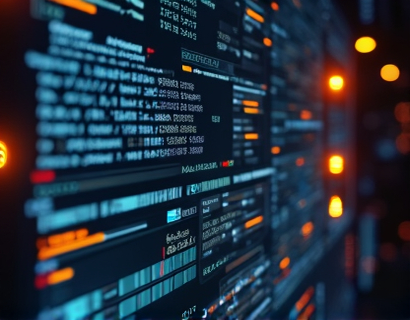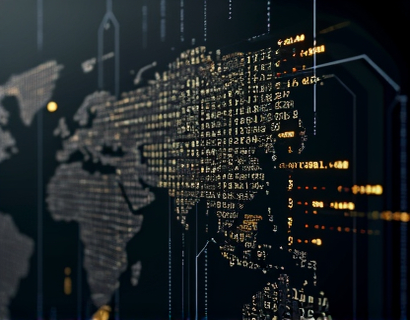AI and Crypto Fusion: Transforming Digital Finance with Intelligent Solutions
The intersection of artificial intelligence and cryptocurrency is giving birth to a new era in digital finance, one that promises unparalleled efficiency, security, and innovation. This fusion is not just a technological curiosity but a transformative force that is redefining how we perceive and interact with financial systems. As we delve into this topic, we will explore the various dimensions of this fusion, from the foundational technologies to the practical applications and future prospects. This journey will be particularly valuable for tech enthusiasts and innovators seeking to understand the profound impact of AI on the crypto landscape.
Foundational Technologies: AI and Cryptocurrency
To comprehend the transformative power of AI and cryptocurrency, it's essential to first understand the foundational technologies driving this fusion. Artificial intelligence, at its core, involves the simulation of human intelligence processes by machines, particularly computer systems. These processes include learning, reasoning, and self-correction. Machine learning, a subset of AI, focuses on building systems that can learn from and make predictions based on data. In the context of cryptocurrency, machine learning algorithms are used to analyze vast amounts of market data, predict price movements, and automate trading strategies.
Cryptocurrency, on the other hand, is a digital or virtual currency that uses cryptography for security. The most well-known cryptocurrency is Bitcoin, but there are thousands of others, each with unique features and use cases. Blockchain technology, the underlying infrastructure of cryptocurrencies, is a decentralized ledger that records transactions across multiple computers in such a way that the registered transactions cannot be altered retroactively. This combination of AI and blockchain creates a powerful synergy that enhances the functionality and reliability of digital finance.
Enhancing Security with AI
One of the most significant benefits of integrating AI into cryptocurrency systems is the enhancement of security. Cryptocurrencies are often targeted by hackers due to their value and the decentralized nature of their networks. AI can play a crucial role in detecting and preventing fraudulent activities. Machine learning algorithms can analyze transaction patterns to identify anomalies that may indicate a security breach. For instance, AI can monitor blockchain transactions in real-time, flagging suspicious activities such as unusual transaction volumes or patterns that deviate from the norm.
Moreover, AI can improve the security of private keys, which are essential for accessing and managing cryptocurrency assets. Traditional methods of storing private keys, such as hardware wallets, can be vulnerable to attacks. AI-driven solutions can generate more complex and secure private keys, and even predict potential vulnerabilities before they are exploited. By continuously learning from new data, these systems can adapt and strengthen their security measures over time.
Optimizing Trading Strategies with AI
AI is revolutionizing the way traders approach cryptocurrency markets. The crypto market is known for its volatility and complexity, making it challenging for traditional trading strategies to yield consistent results. AI algorithms can process and analyze vast amounts of data, including historical price data, news sentiment, and social media trends, to make informed trading decisions. These algorithms can identify patterns and trends that are not immediately visible to human traders, providing a competitive edge.
Automated trading bots powered by AI can execute trades 24/7 without emotional bias, adhering strictly to predefined strategies. These bots can adjust their strategies in real-time based on market conditions, optimizing performance and maximizing returns. For example, a bot might use technical analysis to identify entry and exit points, or it could employ fundamental analysis to assess the underlying value of a cryptocurrency. By leveraging AI, traders can reduce human error and increase the efficiency of their trading operations.
Smart Contracts and Decentralized Applications
Smart contracts are self-executing contracts with the terms of the agreement directly written into code. They run on blockchain networks and automatically enforce and execute the terms of the contract when predefined conditions are met. AI enhances the capabilities of smart contracts by enabling more complex and dynamic logic. For instance, AI can be used to predict future events or conditions that trigger the execution of a smart contract, making them more responsive and adaptive to changing circumstances.
Decentralized applications (dApps) are another area where AI and cryptocurrency converge. dApps are applications that run on decentralized platforms, such as blockchain, and offer functionalities similar to traditional applications but with enhanced security and transparency. AI can be integrated into dApps to provide intelligent services, such as personalized recommendations, fraud detection, and automated customer support. For example, a decentralized finance (DeFi) platform could use AI to offer tailored investment advice or to automate the execution of complex financial transactions.
Improving User Experience through AI
The user experience in the crypto space can be significantly enhanced through AI. Many users find cryptocurrency platforms complex and difficult to navigate, especially for those new to the space. AI-powered chatbots and virtual assistants can provide intuitive and personalized support, guiding users through the process of setting up wallets, understanding blockchain concepts, and executing trades. These AI assistants can learn from user interactions, improving their responses and recommendations over time.
Additionally, AI can be used to analyze user behavior and preferences, allowing platforms to offer customized experiences. For instance, a crypto exchange could use AI to recommend relevant assets based on a user's trading history and risk tolerance. This level of personalization not only enhances user satisfaction but also increases engagement and loyalty.
Challenges and Considerations
While the fusion of AI and cryptocurrency offers numerous benefits, it also presents several challenges that must be addressed. One of the primary concerns is the regulatory landscape. The crypto space is still largely unregulated, and the integration of AI adds another layer of complexity. Regulators are beginning to take notice of these developments, and there is a growing need for clear guidelines to ensure that AI-driven crypto solutions are used responsibly and ethically.
Another challenge is the technical complexity involved in developing and maintaining AI systems. Building robust and reliable AI models requires significant expertise and resources. Moreover, the quality of AI-driven insights heavily depends on the data used to train the models. Inaccurate or biased data can lead to flawed predictions and decisions, which can have serious consequences in the high-stakes world of cryptocurrency trading.
Privacy is also a critical concern. While AI can enhance security, it can also be used to invade user privacy if not properly managed. Ensuring that AI systems respect user privacy and comply with data protection regulations is essential for building trust and maintaining user confidence.
Future Prospects: The Next Generation of FinTech
Looking ahead, the fusion of AI and cryptocurrency is poised to drive significant advancements in the FinTech industry. One of the most exciting prospects is the development of more sophisticated DeFi platforms. These platforms can offer a wide range of financial services, from lending and borrowing to insurance and investment, all powered by AI-driven algorithms. The combination of AI and blockchain can create more efficient, transparent, and accessible financial systems, democratizing access to financial services globally.
Another area of growth is the integration of AI into cryptocurrency research and development. AI can accelerate the discovery of new cryptographic algorithms, optimize blockchain architectures, and enhance the performance of existing systems. This can lead to more secure, scalable, and user-friendly crypto solutions, further driving adoption and innovation.
Moreover, the rise of central bank digital currencies (CBDCs) presents an opportunity for AI to play a pivotal role in the design and implementation of these digital currencies. AI can help central banks manage and monitor CBDCs, ensuring security, stability, and efficiency. The integration of AI in CBDCs can also enable more sophisticated monetary policies and financial oversight.
In conclusion, the fusion of AI and cryptocurrency is not just a technological trend but a transformative force that is reshaping the digital finance landscape. By enhancing security, optimizing trading strategies, improving user experience, and paving the way for innovative FinTech solutions, this fusion is opening up new possibilities for the future. As we continue to explore and harness the potential of AI in the crypto space, the possibilities are endless, and the future looks brighter than ever.










































